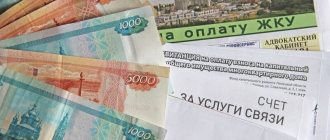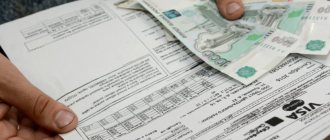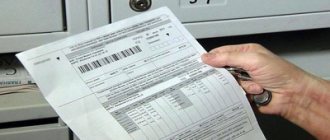Legislation
The obligation to make monthly payments for housing and communal services is fixed in Article 155 of the Housing Code of the Russian Federation dated December 29, 2004 No. 188-FZ. According to the law, the owner must transfer funds to the management company’s account no later than 10 days after the end of the month following the billing period.
Payment may be made later if the condition is specified in the agreement between the service provider and the apartment building. The decision to postpone the repayment of debt for housing and communal services can be made at a general meeting of residents.
Attention! According to Art. 155 of the Housing Code of the Russian Federation, payment after the specified period is considered a violation of the agreement between the tenant and the management organization. But liability for non-payment occurs if contributions are delayed by 31 days or more.
Can gas, sewerage, hot water be turned off...
Let's look at what kind of debt can cause the utility supply to be turned off. The law gives the service provider this opportunity only 3 months from the moment the debt is formed.
The size of the debt doesn't matter. The issue is resolved within the specified period both in relation to a large debt and in case of a small amount of debt.
List of services subject to disconnection for non-payment:
- hot water;
- gas;
- electricity;
- intercom.
Procedure for disconnecting utilities in case of non-payment:
- Sending the debtor notification of the amount of debt in person or by mail.
- Providing 3 days to pay the debt.
- Disabling services (even in the absence of the owner).
The service can be resumed if the debt is paid or a debt restructuring agreement is signed. The supplier must resume the service within 2 days.
List of mandatory payments
The management company can sue for non-payment of utilities if the contract is not observed for 3 months or more.
When calculating the payer's debts, contributions for mandatory housing and communal services are taken into account:
- Heating.
- Water supply.
- Drainage.
- Electricity.
- Garbage removal.
Internet and television are not included in the list of required services. If debt repayment is refused, providers limit access to the tariff. Other housing and communal services providers also go to court if the debt on receipts exceeds 10 thousand rubles.
From the video you will learn what will happen if you do not pay for housing and communal services:
Responsibilities for making payments for apartment utilities
Different categories of citizens have obligations to pay for services under different circumstances:
- owners - upon the onset of the right of ownership and disposal of housing;
- Tenant – signing a social lease contract or commercial lease of premises.
If the listed persons use all public services that make living easier, they must pay for the benefits provided to them. Ignoring this rule may well lead to the disconnection or termination of the supply of services, or the company going to court, with subsequent debt collection.
Legal regulation
Articles number 30 and 154 of the Housing Code of the Russian Federation provide a list of mandatory payments:
- Consumers must pay for the services provided for the maintenance and repair of household appliances and mechanisms.
- For the supply of thermal fluid for heating the apartment, even in the event of a temporary lack of supply. This is enshrined in Government Resolution No. 354 (as amended in 2021).
- When social or commercial hiring, you should rely on Art. 153 housing legal act.
The old resolution, which was in force until the end of 2021, allowed property owners to legally not pay expenses if no one lived in the apartment for a long time. However, the new standards with adjustments are based on the number of persons officially registered in the apartment.
The presence of metering equipment allows you not to pay for electricity, cold and hot water, gas if you have not used them. But for comprehensive maintenance of household appliances and mechanisms, the amount is charged every month, regardless of whether someone lived in the apartment or not.
Watch the video: “Housing and communal services. Mega bomb. Now you don’t have to pay 100%.”
Acceptable period when you can not pay for utilities in the apartment without consequences
Of course, not every homeowner dreams of becoming a habitual defaulter. The owner of the apartment may be fired from his job, perhaps a large amount will be spent on treatment or another unfavorable situation, which will lead to the formation of debt. The management company will not be interested in why its subscriber does not pay for services, if he must, pay. Therefore, an additional agreement with the utility company will help you temporarily avoid paying overdue bills. The user does not pay, and the management company does not require it, again, temporarily.
The apartment tenant will not have to count on a completely interest-free deferment, but this will save him from visiting the courtroom or having his property seized.
A citizen should enter into a certain agreement with utility services, according to which he undertakes to make payment a little later. However, it must be added that the services have the right to act at their own discretion, i.e. whether to enter into such agreements or not. They can make an exception only for a disciplined user. Those who are not, have the right to refuse.
There is a second legal way to avoid charges for renting an apartment, maintenance, major repairs, heating media, and other utilities provided for general household needs. A homeowner who is absent for more than 5 days has the right to submit a petition for recalculation of utility services provided according to consumption standards, in order to legally avoid paying for housing and communal services.
Such a statement is drawn up before the consumer’s departure or upon his return, but no later than 30 days from the date of arrival. The specified period has the right to be extended if it was missed for reasons beyond the will of the person, for example, a long-term serious illness. Even the judicial authorities can pay attention to such a petition and make a decision in favor of the tenant. However, the circumstances must be confirmed by certificates and other official evidence.
Consequences of non-payment of utilities
Rent debt for 90 days or more leads to negative consequences for the apartment owner.
Homeowners' associations and management companies, in order to return cash for housing and communal services provided, apply the following types of penalties:
- Warning.
- Accrual of fines and penalties.
- Repeated warning.
- Shutdown (full or partial).
- Forced collection of debt through court.
Expert opinion
Klimov Yaroslav
More than 12 years in real estate, higher legal education (Russian Academy of Justice)
Ask a Question
Measures to repay the debt are taken gradually, starting with a warning and ending with legal proceedings. If the owner does not intend to repay the rent debt, he faces the loss of his reputation and even property.
Warning from utilities
The first actions against a willful defaulter are preventive measures. Utility companies are not interested in immediately disconnecting a customer from service. But if his debt exceeds 10 thousand, the company suffers losses.
Reference! According to the law, the first penalty is written notification of the existence of a debt. The customer may receive a receipt with the amount due or a separate warning.
The notification is sent to the registered address of the property owner.
The message from utility services states:
- Amount of debt.
- Penalties and fines.
- Payment deadline.
- Consequences for the owner if he refuses to pay.
The warning is received within 20 days from the date of debt formation. According to Art. 155 of the Housing Code of the Russian Federation, the period after the expiration of a 31-day refusal to make payments to housing and communal services is taken into account. The homeowner may receive notice of the need to repay financial obligations 2 months after the debt was incurred.
If the property owner chooses to wait and not pay, the warning will be followed by another penalty - a fine.
Calculation of a fine
After 31 days of non-payment of the debt, penalties are applied to the owner. Clause 14 of Article 155 of the RF Housing Code states that the amount of recovery is 1/300 of the refinancing rate established by the Central Bank of the Russian Federation in relation to the amount of debt. As of May 25, 2021, the current refinancing rate is 7.75% per annum.
Fines for debtors who do not pay for 91 days or more increase to 1/130 of the refinancing rate. Penalties are accrued daily until obligations to the creditor are fulfilled. If a debt lasts more than 3 months, the amount of the fine does not increase.
Important! The calculation of the fine is regulated by law. Utilities cannot charge a customer more than 1/130 of the refinance rate based on the total amount owed to date. The accrual of fines in excess of the established norm may lead to a reverse claim of arbitrariness against the housing and communal services.
Before collection, the debtor receives a warning. In the absence of actions aimed at getting rid of debts, the housing and communal services provider again issues a warning.
Repeated notifications
Utilities do not disconnect customers from service until the second notice is ignored. It arrives 20 days after the end of the deposit period.
It will not be possible to avoid paying for a long time after receiving the second notification.
The document is the last warning, after which the debtor may lose the use of the service completely. What is stated in the repeated notice:
- The full amount of the debt, taking into account accrued penalties and fines.
- Repeated payment terms.
- Possible consequences if you ignore your obligations to repay the debt.
- Timing of initial service deactivation.
- Date of termination of the contract with housing and communal services.
Reference! The contract is considered terminated from the moment the apartment is completely disconnected from the supply of housing and communal services. By law, the management company is obliged to notify residents no later than 3 days before the planned cutoff of rent.
Utilities do not have the right to terminate the contract without written notice. For this, they face a lawsuit from residents who may complain about violation of the law.
Disconnection from the service
Ignoring all warnings and refusing to repay the debt threatens the owner with utility service disconnection. Large rent debt can speed up the process.
If the company has received less than 50 thousand rubles, notifications about possible restrictions on the service may arrive earlier than 3 months after the refusal to make payments for the apartment.
Renewal of the contract: features
Once the supply of utility services is cut off, the property owner will not be able to simply pay the debt in order to use the amenities again.
To re-enter into a contract, the client must:
- Pay the debt, including all penalties and fines.
- Bring receipts confirming the fact of transfer of funds to the management company.
- Write applications for renewal of the contract with the HOA or management organization.
Expert opinion
Klimov Yaroslav
More than 12 years in real estate, higher legal education (Russian Academy of Justice)
Ask a Question
Resumption of service is possible after 3 working days from the date of registration of the application at the utility office. Sometimes the process drags on for 10 days or more if the payer lives more than 50 km from the utility branch, or all employees are busy.
Transfer to court
If the owner does not pay debts after notices and service restrictions, utility services file a claim in court.
In relation to persistent defaulters, the court may take various penalties:
- Seizure of accounts and property.
- Ban on travel outside Russia.
- Temporary revocation of a driver's license.
- Confiscation of property, including property.
- Eviction of the debtor and his family from housing.
The latter penalty is applicable only to citizens living under a social tenancy agreement. They are most at risk of losing their place of residence if they have been in debt for 6 months or more. A municipal apartment can be taken away after 7 months of late payments if the court rules in favor of the utility services.
Evicting tenants during a foreclosure process is not possible if the property owner has no other property suitable for occupancy. The company also does not have the right to take away the only housing from children, even if the owner has not paid for utilities for a long time.
Expert opinion
Klimov Yaroslav
More than 12 years in real estate, higher legal education (Russian Academy of Justice)
Ask a Question
When there is a large amount of debt for utility services, even companies that are late in payments for six months are sued. The debtor learns from the notice that his case is being considered in court. It is personally delivered by the postman against the signature of the property owner.
What to do if tenants do not want to move out of the apartment and do not give up the keys
Naturally, it is first of all desirable to resolve the issue amicably, to come to an agreement with unscrupulous tenants, in order to convince the tenants to vacate their living space voluntarily.
Otherwise, written warnings will first follow with a requirement to vacate the living space.
In this case, it is worth having for yourself an act of delivery or non-delivery, notice of termination of the lease agreement, or a postal receipt with an inventory of the contents, confirming that it was sent to unscrupulous tenants.
It would also be useful to communicate with the local local police inspector. He has the right to conduct a preventive conversation with tenants.
If there is a written lease agreement, a lawsuit is filed in court for eviction. He is addressed to the court at the location of the rented apartment, which they do not want to vacate.
In the documents submitted to the district court, you should write about the lease agreement, indicate evidence of the debt, and also mention pre-trial ways to resolve the conflict.
Be sure to raise the issue in your lawsuit not only about eviction, but also about collecting the accumulated debt for rent and utility bills.
When the court decision comes into force, the next step will be to obtain a writ of execution. Even when the case is heard on appeal, it is issued by the trial court.
There can be two writs of execution: for the eviction itself and for collection of debts for all payments. In any case, you should contact the bailiffs for help in evicting impudent tenants from the apartment.
Legal methods of non-payment
Clients may not pay rent if:
- The service is provided inappropriately.
- They have already paid utility bills in the current period. Sometimes you receive repeated notifications demanding payment, which should be ignored if all debts are paid off.
- The supplier provided incorrect details. This happens when the management company changes. It is recommended that you contact the supplier's office to obtain a current invoice number or ask for a new payment notice.
- There was an overpayment for the previous period. Incorrect meter transfers or voluntary contributions above the norm can be the reason why homeowners have the right to legally not pay for several months.
It is the owner's duty to pay utilities. In the absence of legal reasons or benefits, the owner becomes a debtor if he does not pay for more than 31 days.
How to reduce costs
If the family of a tenant or homeowner lacks finances, this does not relieve them of responsibility for paying for the apartment.
In this case, you can apply for a subsidy from the social protection authorities, this will significantly reduce the cost of paying for services.
Only the benefit is given to those who have no debt for the previous period.
If the residents of the house are dissatisfied with the quality of the services provided, they have the right to demand compensation from the management company through the court.
The reasons for complaints are usually low gas pressure, low hot water temperature, and poor condition of the local area.
Debt repayment options
You can use the following options to pay off your debt:
| Registration of a subsidy | The benefit is available to both homeowners and renters, unless they have debts on utility bills and housing maintenance costs them more than 22% of the total family income. |
| Debt restructuring agreement | It is concluded for six months or more. The payment is repaid in stages and simultaneously with the next monthly payment. |
| Receiving installments | Payments occur in equal installments throughout the year. The service is provided only to those persons who made all payments on time and had no problems with their payment. |
| Receiving benefits from the state | They can be received by pensioners, low-income citizens, disabled people and their families, and orphans. To receive assistance, you should contact the social protection authorities at the local administration. |
So, if you don’t pay rent, then it’s possible:
- accrual of penalties;
- suspension of services or their restriction;
- if the requirements of the Criminal Code are ignored, the case may go to court;
- debt collection from wages;
- ban on leaving the country;
- arrest and sale of housing;
- eviction from occupied living space.
Timely payment of utility bills is the responsibility of home owners or tenants and is enshrined in law.
If property owners or responsible tenants of municipal housing do not pay rent and evade payments, then the judicial authorities of the Russian Federation can prosecute them administratively until they fully repay the debt.
Privileges
It is not recommended to wait until the debt grows to 300 thousand: if you have problems repaying housing and communal services, it is better to contact the supplier directly. But some categories of citizens of the Russian Federation have the right not to pay utility bills completely or partially. These are beneficiaries who are allowed by the state to reduce the cost of maintaining their property by up to 100%.
According to Article 159 of the Housing Code of the Russian Federation, subsidies for utilities are available only to citizens of the Russian Federation.
Benefits are provided:
- veterans of the Great Patriotic War and military operations;
- disabled people of groups 1 and 2;
- Knights of the Order of Glory;
- Heroes of Russia and the USSR;
- labor veterans;
- some pensioners.
To receive a subsidy for housing and communal services, you should contact the territorial social protection authority with a passport and a document confirming your right to the benefit.
What you need to know
Citizens of the Russian Federation who do not have a debt to the management company can receive a subsidy for paying for utility services (Article 159 of the Housing Code of the Russian Federation).
If available, preferential categories have the right to receive reimbursement of housing costs if the payment is late due to a valid reason:
- Delay of wages.
- Loss of a job, inability to get a new job (if there are attempts).
- Inpatient treatment for the property owner or family members.
- The presence in the family of a minor child, a disabled person or an incompetent member of society.
Expert opinion
Klimov Yaroslav
More than 12 years in real estate, higher legal education (Russian Academy of Justice)
Ask a Question
The reason why the debt arose to public services requires documentary confirmation: a certificate from work, about the composition of the family, from the social service.
Actions of bailiffs in case of violation
If in a privatized apartment the debtor does not pay the obligations, or the tenant does not fulfill the requirements under the rental agreement, the bailiffs can recover funds from such clients to the service provider.
Actions of FSSP employees:
- Notice of seizure. Warning in the form of an SMS message from all banks with which the client opened accounts or cards.
- Collection in the amount of debt for utilities. Bailiffs can write off no more than 50% of the debtor’s income to the management organization.
- Seizure of property. If the client’s funds or income are insufficient, FSSP officers may seize the citizen’s property.
- Transfer of property as payment for a debt. For a debt of 100 thousand, the apartment will not be taken away, but an arrest will be imposed. Defaulters may lose their housing if they owe a debt of 1 million rubles or more.
Debt repayment methods
The debtor has the right to deposit funds into the utility account in any convenient way:
- pay at the cashier. During a personal visit, the client can also change the terms of the contract or demand a recalculation;
- make a transfer at the bank. The period for crediting cash is up to 3 working days. Financial institutions charge a commission of 0–5% for services;
- pay online. Through online banks, wallets or payment services. This is the fastest way to pay for utilities, since funds are credited 1 minute after the transaction;
- through payment terminals. Receipt time is from 1 minute to 24 hours. It is recommended to keep receipts to prove the transfer of funds if a technical failure occurs.
Management companies do not impose requirements on debtors regarding the method of making payments to repay obligations. It is beneficial for HOAs and other organizations that the home owner pays off debts as quickly as possible, so they accept any receipts as confirmation that funds have been deposited.
You will learn what happens if you don’t pay utilities from the following video:
Is it possible not to pay debts? Debtor's life
However, does this mean that the defaulter has the opportunity, on completely legal grounds, to continue to live and not pay utility bills?
Actually this is not true.
- First, once you accumulate a certain amount of debt, you can say goodbye to the idea that you own your home. The apartment will be seized, and no legal transactions can be carried out with it until the debt is fully repaid, which is especially important - it cannot be passed on by inheritance. After the death of each owner, his share becomes the property of the organization in whose favor the encumbrance (seizure)
.
- Secondly,
no one canceled
(by court decision) And the fact that you cannot deprive the owner of an apartment does not mean that you cannot deprive him of valuable (and not so valuable)
things that are in the apartment, of his personal vehicle.
The most unpleasant thing for the defaulter in this situation is that, among other property, bank accounts (and, accordingly, cards)
.
He will not be able to receive any money without part of it being written off to pay off the debt. However, this paragraph contains one small but important point - the amount of deduction should not exceed 50% of the salary or other income received for the calendar month.
- For those who, in principle, have money, but for some reason refuse to pay for utilities, the following restriction is provided: a ban on leaving the country. At the border he will simply be turned back if the amount of his debt reaches 30 thousand rubles (at the moment, deputies are trying to change the law so that the “travel ban” amount is increased to 60 thousand rubles)
.
Procedure for disconnecting services for non-payment
Housing and communal services services, after a written warning (3 days in advance), send an employee who blocks the supply of electricity, gas, and water to the debtor. Heating is a service that utility companies will not be able to turn off, even if there is a debt. The rule is stated in the Decree of the Government of the Russian Federation of August 8, 2012 No. 808. Restrictive actions can only be applied in the event of a temporary elimination of the malfunction. Complete isolation and termination of the contract cannot be carried out only at the initiative of the housing and communal services supplier.
If a client refuses to pay for utilities, he may lose his property. Fines for late payments are accrued starting from the 2nd month. The company may require the funds to be paid in a lump sum or allow the payment to be split over several periods.
Advice for debtors:
- Pay all overdue payments within 3 months. Once fines are assessed, the case will go to trial.
- Do not refuse cooperation if the supplier offers other tariffs and the opportunity to recalculate.
- Take advantage of programs that allow you to reduce debt, learn about possible benefits and co-financing programs.
- Respond to notices and notices received by mail from representatives of utility services.
- Contact the office in person if you have financial problems. Employees do not take harsh measures if the client voluntarily explains why he is delaying payment.
The debtor's cooperative actions may help him negotiate a possible deferment of payments and a reduction in penalties. This will reduce the amount of fines and preserve property ownership.








